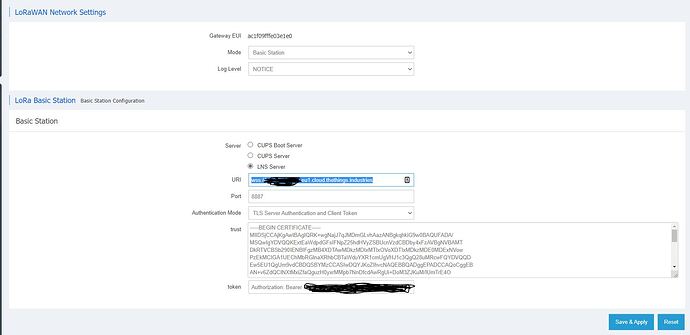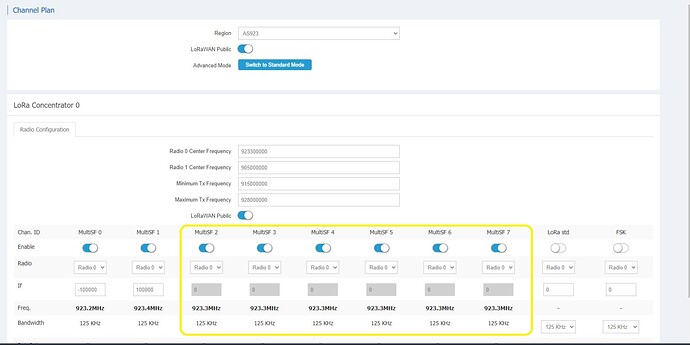Sorry I copied ‘n’ paste the image from the first post rather than re-uploading it. I didn’t realise that the image quality had been reduced from the thumbnail in the preview.
Below is representative of the RAK Gateway request logging after my RAK811 end node has been power cycled
Every so often I see a successful join on 923.2/923.4MHz
09:27:33923.4-479.25-CRC_OKLORA4/5SF7BW125-57----AppEUI70 B3 D5 7E D0 00 00 00DevEUI60 C5 A8 FF FE 77 7C 32{
“freq”: 923400000,
“chan”: 1,
“tmst”: 238779451,
“utmst”: 1612211254166,
“rfch”: 0,
“stat”: 1,
“rssi”: -47,
“size”: 23,
“modu”: “LORA”,
“datr”: “SF7BW125”,
“codr”: “4/5”,
“lsnr”: 9.25,
“data”: “AAAAANB+1bNwMnx3/v+oxWCvzQmEgD0=”
}{
“MHDR”: {
“MType”: “Join Request”,
“RFU”: 0,
“Major”: 0
},
“JoinRequest”: {
“AppEUI”: "70 B3 D5 7E D0 00 00 00 ",
“DevEUI”: "60 C5 A8 FF FE 77 7C 32 ",
“DevNonce”: “CDAF”
},
“MIC”: “3D808409”
}
09:27:38923.4–14NO_CRCLORA4/5SF7BW125-72----{
“freq”: 923400000,
“mode”: “timerstamped”,
“tmst”: 243779451,
“rfch”: 0,
“powe”: 14,
“prea”: 8,
“ncrc”: true,
“modu”: “LORA”,
“datr”: “SF7BW125”,
“codr”: “4/5”,
“ipol”: true,
“size”: 33,
“data”: “IA1g5+XgG33Qu7SjSG2uk+TEQx8SCME1m185DFzY9LNl”
}{
“MHDR”: {
“MType”: “Join Accept”,
“RFU”: 0,
“Major”: 0
},
“JoinAccept”: “0D60E7E5E01B7DD0BBB4A3486DAE93E4C4431F1208C1359B5F390C5C”,
“MIC”: “D8F4B365”
}
Most of the time the join requests are on a selection of other frequencies and there is no “Join Accept” response.
09:15:55924-519.75-CRC_OKLORA4/5SF7BW125-57----AppEUI70 B3 D5 7E D0 00 00 00DevEUI60 C5 A8 FF FE 77 7C 32{
“freq”: 924000000,
“chan”: 4,
“tmst”: -459107597,
“utmst”: 1612210556272,
“rfch”: 0,
“stat”: 1,
“rssi”: -51,
“size”: 23,
“modu”: “LORA”,
“datr”: “SF7BW125”,
“codr”: “4/5”,
“lsnr”: 9.75,
“data”: “AAAAANB+1bNwMnx3/v+oxWA5eGjRu1E=”
}{
“MHDR”: {
“MType”: “Join Request”,
“RFU”: 0,
“Major”: 0
},
“JoinRequest”: {
“AppEUI”: "70 B3 D5 7E D0 00 00 00 ",
“DevEUI”: "60 C5 A8 FF FE 77 7C 32 ",
“DevNonce”: “7839”
},
“MIC”: “51BBD168”
}
09:16:00924–14NO_CRCLORA4/5SF7BW125-72----{
“freq”: 924000000,
“mode”: “timerstamped”,
“tmst”: -454107597,
“rfch”: 0,
“powe”: 14,
“prea”: 8,
“ncrc”: true,
“modu”: “LORA”,
“datr”: “SF7BW125”,
“codr”: “4/5”,
“ipol”: true,
“size”: 33,
“data”: “IEJK4ghZBoHoS/1X0+mTZSd2W/0a96XFaqa5nx6p1tHD”
}



